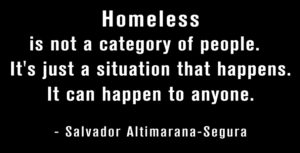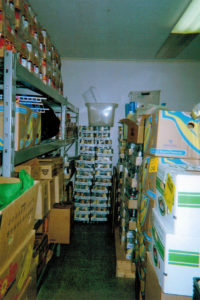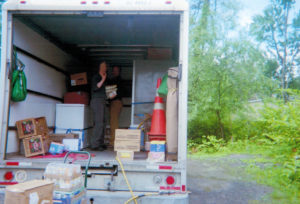January 6, 2021 at 7:47 pm


If you read my last post – “Food Pantry Rules” – you may have thought you were in some time warp. Travel had returned you to about 2010.
Well, not really.
The pandemic changed many details but the bones of a food pantry event are the same.
The volunteers and the people who shop at the pantry are the same.
Everyone comes together looking for groceries but often, they want and need far more.
Food pantry lines get longer every pantry day because people, families, struggle with change they didn’t ask for.
They are rewriting their destiny stories without a road map or instructions.
A number of people in the food pantry, both shoppers and volunteers, didn’t know about food pantries until circumstances set up a situation where they suddenly looked around and realized they were in a car in a long line waiting for food.
There is a name for this category: SITUATIONAL POOR.
A person fits into the situational poor category when she lands in a situation created by an event such as a hurricane, fire, flood, pandemic, or other disaster which destroys the home, car, job.
Food pantries offer much – peace, community, spiritual connection, groceries.
A food pantry in the basement of a church is a cross between a church and a busy pizza place.
A food pantry in a line of cars in a pandemic is reminiscent of the mass food distributions we held periodically in New York State after the collapse of the economy in 2008.
A line of cars filled with people needing food wraps around the block, down the road, and even further.
A whistle blows.
The cars begin to move. A volunteer puts a bag (s) of food in each vehicle.
Everyone wears masks.
There are still food pantries where people show up to a church and receive a bag of groceries.
But, whether the food is distributed to hungry people in cars or to hungry people walking to a building, a food pantry distribution is not a program. It is a community made up of those who gather the food and distribute it, and those who receive it. The process of distributing the food to people creates a change in everyone.
The experience does not heal a person. Nor does it change the story. It does not offer therapy. The experience itself is a conduit for each person’s own spiritual growth and change.
Never once when I was involved in a food pantry did I kid myself into thinking that I was winning the war against hunger. And, I do not kid myself now.
I know this food pantry food distribution experience does not end hunger. Instead, it offers food for several meals. And, that is all.
Ending hunger is another matter altogether.
I do feel, though, that the rules are changing. The pandemic experience is altering the hunger situation dramatically, at least. The pandemic experience is altering the hunger situation permanently.
“How is that?” you ask.
The pandemic has changed how our food is grown and distributed. Food pantries are a link in the food distribution chain. This chain now looks different. The link connections are different.
“How is that?” you ask.
For one thing, the restaurant industry is different.
Food production and distribution is different.
I do not think we know yet just what the fallout is. We have yet to live out the end of this story. We’re living and experiencing the future. For some, it is hard to see the big picture because the changes have not yet come around for each of us to see and experience in our daily lives.
In any event, the Pandemic is not us what we think. Our opinions and preferences don’t count for much here.
One thing is certain, our future is destined to be different from a future without a Pandemic. Another thing is certain for me: We can never return to our past.
We are all destined to experience a new Pandemic future.
Whatever the future brings, we need to keep on feeding the hungry in whatever way that works.
Thank you for reading this blog post. Please forward this article to your preferred social media network.
Share it with your friends.
Thurman Greco



June 9, 2017 at 8:54 pm

Kingston, New York is a rapidly gentrifying and trendy trendy little town in New York State. Almost every day I see new neighbors in this community. They’ve found just the perfect weekend apartment and are ecstatically, euphorically furnishing it with just the perfect finds. In short, they are in love with Kingston!
In their giddiness, they have may not have yet noticed the Caring Hands Food Pantry and Soup Kitchen. Or maybe they have. Maybe they see that one of the most important things about Kingston is that the residents care for one another. This attitude helps make Kingston what it is – a community we all want to be part of.
2017 is turning out to be a tough year for food pantries in general and Caring Hands Food Pantry in Kingston, New York in particular. But, Caring Hands isn’t just a food pantry. It’s a soup kitchen, and a warming center with a recovery and twelve-step program. As if that’s not enough, they’ve got a free legal clinic, too.
Volunteers at Caring Hands, under the direction of the Rev. Darlene L. Kelley at the Clinton Avenue Methodist Church, work hard as they put their beliefs into action daily. Almost 600 meals are served weekly in the soup kitchen. Over 3,000 households receive groceries monthly.
Children, the elderly, families, veterans, and the ill are all welcome at Caring Hands. The goal is to help people in need help themselves. The message of God’s transforming love is spread throughout the community from the Clinton Avenue Methodist Church as it ripples out in waves.
It is easy for you to be a part of this message. You don’t have to move to Kingston. You don’t have to attend the church there. You don’t even have to know anyone in the area. All you need to do is give a little … or a lot … of whatever you can share.
- Sending a check always helps. Caring Hands always needs money.
- Sending a gift certificate always helps, too. Did someone give you a gift certificate that that you’ll probably never use? Well, now is a good time to use it. Send it on over.
- Extra time is extremely valuable. If you live in the area, you can be a part of this miracle when you volunteer. Your gift of presence will be greatly appreciated.
- Hold a food drive. Gifts of food are always, always needed. If you don’t live in the area, hold a food drive anyway and donate the cans and boxes of food to a food pantry in your area.
- Call an elected representative and lobby for the poor and hungry in your area. Persuade this elected official to be generous with funds for those around us who do not have everything they need to live a healthy life.
- Your prayers and kind thoughts are always welcome. Those at Caring Hands as well as at other food pantries throughout our country are working hard to bring food and love to a broken community. They need your support.
Caring Hands has a mailing address to send your check and/or gift certificates: CARING HANDS
c/o THE CLINTON AVENUE UMC
P. O. Box 1099
Kingston, New York 12402.
Thank you for reading this blog post. Hopefully you’ll share it with your favorite social media outlet.
With this blog posted article comes an apology for not having posted often enough in the past months. This doesn’t mean that I don’t care or that I’m no longer interested in hunger. To the contrary. I’m deeply involved in bringing my next book to my publisher. And, it’s about hunger in America.

Thurman Greco











